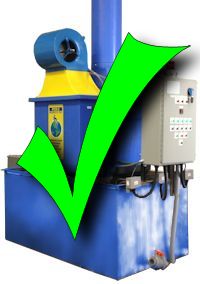Can I Evaporate My Hazardous Waste?
If you are not sure if you could or should evaporate your hazardous waste, review the article below for answers from the Ohio EPA.
The following article was written by, Dan Sowry, Regulatory Services Unit courtesy of the Ohio EPA Website
 Ohio EPA has received numerous questions concerning the use of evaporators for on-site treatment of hazardous waste. The crux of most of these questions is – can I evaporate the Water from my hazardous waste? Under certain circumstances, generators can evaporate the water from their hazardous waste, even without a hazardous waste permit.
Ohio EPA has received numerous questions concerning the use of evaporators for on-site treatment of hazardous waste. The crux of most of these questions is – can I evaporate the Water from my hazardous waste? Under certain circumstances, generators can evaporate the water from their hazardous waste, even without a hazardous waste permit.
Evaporators are used to expedite the reduction of water in hazardous waste. This reduces the weight and volume of the waste and only the remaining residue is left for disposal as hazardous waste. Recently, Ohio EPA considered evaporators that were not part of an exempt unit, such as a reclamation unit, wastewater treatment unit or elementary neutralization unit, to be thermal treatment units. Ohio EPA has established hazardous waste rules for thermal treatment units.
This activity requires a hazardous waste installation and operation permit, and cannot be conducted under the generator treatment provision of OAC rule 3745-52-34 which allows generators to treat hazardous waste they generate on-site without a hazardous waste permit, provided they comply with the requirements of OAC rule 3745-52-34. For more information on generator treatment, refer to our (EPA) fact sheet on the Regulatory Status of Generator Treatment.
After further review, Ohio EPA determined that the intent of the rules regulating thermal treatment are directed at thermal destruction or incineration, not the simple addition of heat to promote evaporation of water. Generators can use evaporators to reduce the volume of their hazardous waste under the generator treatment requirements. However, if there is a release of hazardous waste or hazardous waste constituent to the air or the environment, this would be considered disposal. A generator is not allowed to dispose of its hazardous waste in this manner. It must be disposed of at a permitted hazardous waste facility. This limits the use of evaporators to aqueous waste that does not contain volatile hazardous constituents (VHCs) unless the VHCs are first removed by filtration or captured in some manner. Evaporators can be used to concentrate certain inorganic wastes, such as acidic solutions with heavy metals. However, some metals, such as lead and mercury, can be released to the air at certain temperatures. Wastes containing organic constituents, such as methylene chloride, are not appropriate for use in an evaporation system unless all vapors are captured and properly managed and there are no releases of hazardous constituents to the air or environment.
Generators may use evaporators to reduce the water content of their hazardous waste if they comply with the generator treatment requirements. The overriding determinant is that hazardous waste or hazardous waste constituents are not released to the environment. For additional information on this subject, please contact the Division of Hazardous Waste Management’s Regulatory Services Unit at: jeff.mayhugh@epa.state.oh.us or (614) 644-2917.

